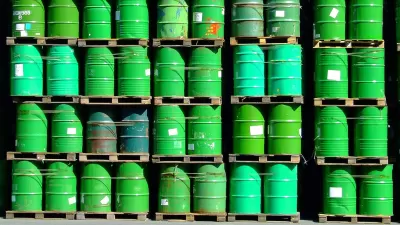Taking a cue from states that have introduced new wholesale taxes on fuel that would presumably be passed to the consumer, Sen. Barbara Boxer has proposed replacing the 18.4-cent federal gas tax with an oil sales fee to be paid by oil refineries.

Keith Laing reports on a Sept. 25 meeting of the Senate's Environment and Public Works Committee, chaired by Sen. Barbara Boxer (D-Calif.) in which a new funding scheme was proposed by Boxer - but first, she offered a witty, yet optimistic appraisal of transportation funding in advance of a possible government shutdown on Tuesday.
"We're here on an issue that has united us, and that's good thing, given that we probably couldn't pass a Mother's Day resolution around here," Boxer said. "I think it's excellent that we can agree that transportation is something we can rally around and work together on."
Laing writes that Boxer said that replacing the federal gas tax with "a wholesale oil tax increase would help close an approximately $20 billion shortfall in transportation spending Congress is looking to solve".
"There are many ideas out there, and the one that I'm leaning toward myself, although this is going to be a decision of the [Senate] Finance Committee ... is to do away with the per-gallon fee at the pump and replace it with this sales fee as they've done in Virginia and Maryland," Boxer said.
However, while both Virginia and Maryland introduced wholesale sales tax to motor vehicle fuel by the gas station (not the refinery), each was accompanied by other taxes. While Virginia eliminated its 17.5-cent excise tax, Maryland kept theirs and indexed it to inflation. Virginia introduced a new .3% general sales tax (exempting gasoline) and a new, annual hybrid and electric vehicle fee.
Boxer added that "(i)t would fund the highway program for six years ... I think, and it would do that by doing away with all the other fees," Boxer continued. "It's a very exciting idea."
This is particularly noteworthy because the current surface transportation law, MAP-21, for which she was credited by being Named National Asphalt Legislator of the Year on Sept. 11 by the National Asphalt Pavement Association, covers only two years instead of the traditional six years. MAP-21 expires next year on Sept. 31. at which time the Highway Trust Fund is expected to become insolvent according to the CBO.
The American Planning Association's Allison Leach also covered the EPW meeting, writing that the wholesale oil tax would be paid at the refinery level. The "idea has been proposed by several research groups as a relatively straight-forward solution", she notes.
Bad news for vehicle-miles-traveled (VMT) fee advocates, if only at the federal level, in that this much-discussed replacement for the gas tax was ruled-out because it faces "serious implementation challenges", writes Leach. Allowing states to pursue VMT fees could still be a consideration though, as has been editorialized here.
However, the much broader motorist user-fee advocacy group no doubt was glad to hear that "Boxer declared consensus around the need for funding to come from 'a user fee related to oil and gas'", Leach writes. It will be a difficult goal to reach considering that "(s)ince 2008 Congress has taken $41 billion out of general revenues for the highway fund, and an additional transfer of $12.6 billion is scheduled for next year", as we noted in "New House Members Get Transportation Insolvency 101 Lesson".
While most in the transportation industry recognize that the most straight-forward way of addressing the transportation funding crisis would be to increase the 18.4-cent federal gas tax, last increased by President Bill Clinton in 1993 and by Presidents Herbert Walker Bush and Ronald Reagan earlier, it is well-recognized that tax increases face considerable political opposition, including by President Obama. However, that has not deterred Boxer from co-authoring a carbon tax bill with Sen. Bernie Sanders (I-Vt.) introduced last February.
FULL STORY: Boxer: Replace gas tax with wholesale oil fees to pay for transportation projects

Trump Administration Could Effectively End Housing Voucher Program
Federal officials are eyeing major cuts to the Section 8 program that helps millions of low-income households pay rent.

Planetizen Federal Action Tracker
A weekly monitor of how Trump’s orders and actions are impacting planners and planning in America.

The 120 Year Old Tiny Home Villages That Sheltered San Francisco’s Earthquake Refugees
More than a century ago, San Francisco mobilized to house thousands of residents displaced by the 1906 earthquake. Could their strategy offer a model for the present?

HSR Reaches Key Settlement in Northern California City
The state’s high-speed rail authority reached an agreement with Millbrae, a key city on the train’s proposed route to San Francisco.

Washington State Legislature Passes Parking Reform Bill
A bill that would limit parking requirements for new developments is headed to the governor’s desk.

Missouri Law Would Ban Protections for Housing Voucher Users
A state law seeks to overturn source-of-income discrimination bans passed by several Missouri cities.
Urban Design for Planners 1: Software Tools
This six-course series explores essential urban design concepts using open source software and equips planners with the tools they need to participate fully in the urban design process.
Planning for Universal Design
Learn the tools for implementing Universal Design in planning regulations.
Ada County Highway District
Clanton & Associates, Inc.
Jessamine County Fiscal Court
Institute for Housing and Urban Development Studies (IHS)
City of Grandview
Harvard GSD Executive Education
Toledo-Lucas County Plan Commissions
Salt Lake City
NYU Wagner Graduate School of Public Service


























